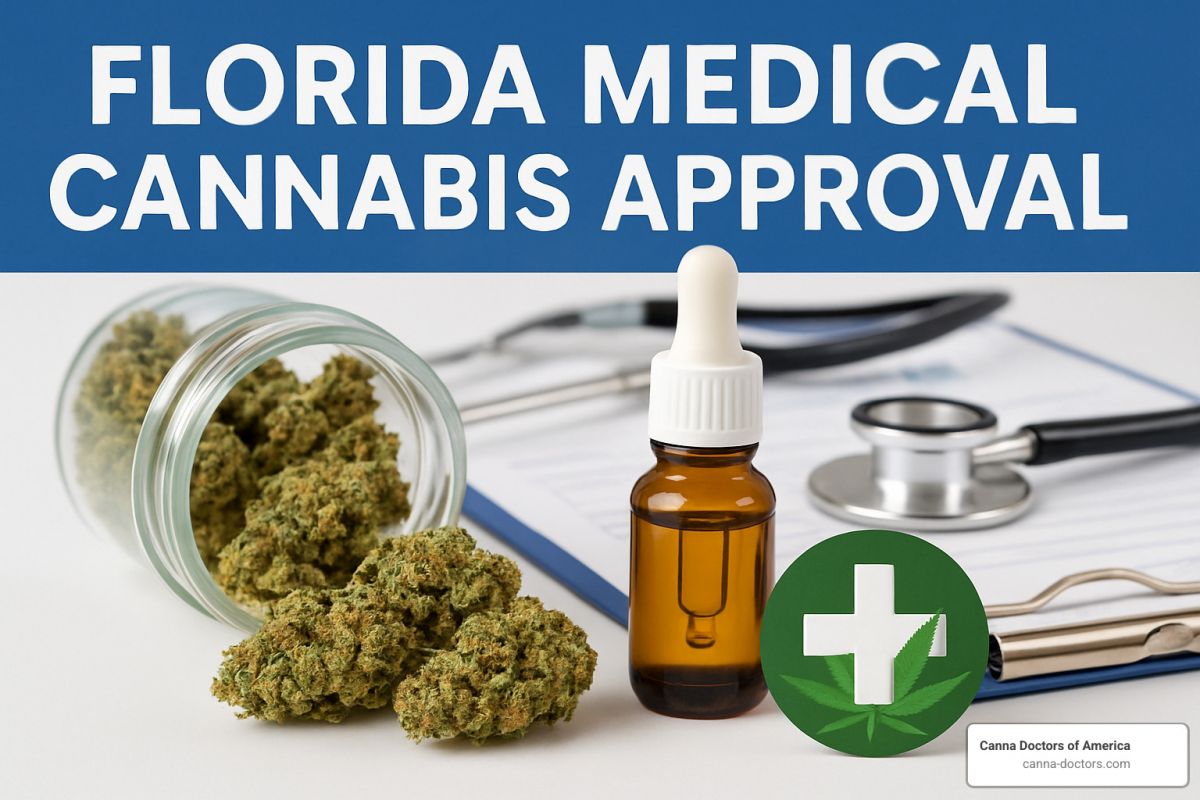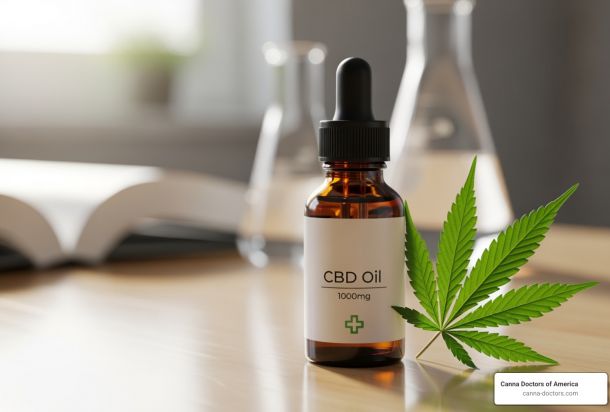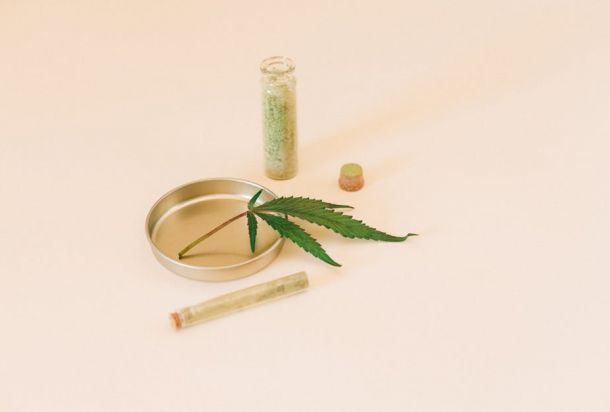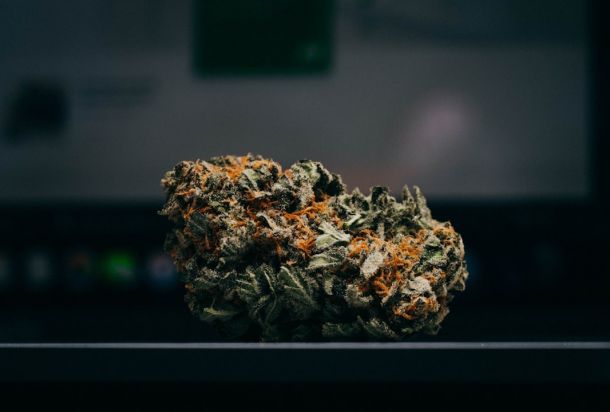Your Roadmap to Florida Medical Cannabis Approval

Why Florida Medical Cannabis Approval is Your Gateway to Relief
Florida medical cannabis approval opens the door to legal, regulated treatment for over 20 qualifying conditions, from chronic pain to PTSD. With 882,524 active patients already enrolled as of November 2024, Florida’s medical marijuana program has become a trusted path to relief for residents struggling with debilitating conditions.
Quick Answer: Florida Medical Cannabis Approval Requirements
– Residency: Florida permanent or seasonal resident (31+ consecutive days)
– Age: 18+ years old (minors need guardian consent + 2 doctors)
– Medical: Qualifying condition diagnosed by state-registered physician
– Process: Doctor visit → Registry entry → $75 state application → 10-day approval
– Cost: $150-200 doctor fee + $75 annual state fee
– Renewal: Doctor recertification every 210 days, card renewal annually
The process has become remarkably streamlined since medical marijuana became fully legal in 2019. You can go from your first doctor visit to purchasing medicine at one of Florida’s 692 licensed dispensaries in as little as two weeks.
Whether you’re dealing with cancer, anxiety, chronic pain, or another qualifying condition, this comprehensive guide will walk you through every step of getting approved, staying compliant, and accessing the relief you need.
I’m Geoff Massey, Regional Director of Canna Doctors of America, where I’ve helped thousands of patients steer Florida medical cannabis approval successfully. My experience with the state’s medical marijuana program has shown me that proper guidance makes the difference between a smooth approval and frustrating delays.
Simple Florida medical cannabis approval glossary:
– Florida cannabis card renewal
– fibromyalgia cannabis treatment
What You’ll Learn
In this comprehensive guide, we’ll cover everything you need to know about Florida medical cannabis approval:
- Eligibility requirements including residency rules, age limits, and qualifying medical conditions
- Step-by-step application process from finding a qualified physician to receiving your card
- Costs and renewal schedules so you can budget for ongoing treatment
- Legal use guidelines including possession limits, where you can purchase, and consumption rules
- Special scenarios for caregivers, minors, and out-of-state visitors
By the end of this guide, you’ll have a clear roadmap to obtaining your Florida medical marijuana card and accessing safe, legal cannabis treatment.
Florida Medical Cannabis Approval: Eligibility & Requirements
Getting your Florida medical cannabis approval isn’t complicated, but you do need to check three important boxes: Florida residency, proper age, and a qualifying medical condition diagnosed by a state-registered physician. Think of these as your foundation – get these right, and the rest of the process flows smoothly.
The whole system started when Florida voters said “yes” to Amendment 2 back in 2016. Over 70% of people supported it, which created the regulated pathway that now helps nearly 900,000 Floridians access the treatment they need. It’s pretty amazing how far we’ve come.
Who Can Apply? Permanent vs. Seasonal Residents
Here’s some good news for our snowbird friends – Florida welcomes both permanent residents and seasonal residents to apply for medical cannabis cards. The state understands that many people split their time between Florida and other states, especially during our beautiful winter months.
If you’re a permanent resident, things are straightforward. You’ll need a valid Florida driver’s license or state ID with your current address. Just make sure the address on your ID matches exactly what you put on your application – mismatched addresses are one of the most common delays we see.
Seasonal residents have a slightly different path, but it’s totally doable. The key rule is the 31-day requirement – you need to live in Florida for at least 31 consecutive days each year. You don’t have to wait 31 days before applying, but you do need to show that you maintain a Florida residence for that long annually.
Most snowbirds successfully get their cards using an out-of-state driver’s license plus two forms of Florida residency proof. The most common combination is a lease agreement and a utility bill, though bank statements and voter registration work too.
| Resident Type | Required Documents | Additional Proof |
|---|---|---|
| Permanent | FL driver’s license or ID | None |
| Seasonal | Out-of-state license + 2 FL proofs | Lease + utility bill (most common) |
| Temporary | FL address verification | Bank statement, voter registration |
Qualifying Medical Conditions for Florida Medical Cannabis Approval
Florida’s approach to qualifying conditions is pretty patient-friendly. The law lists 12 specific conditions, but here’s the really important part – physicians can also recommend cannabis for any condition where they believe the benefits outweigh the risks. This “physician discretion” provision has opened doors for patients with over 70 additional conditions.
The explicitly defined qualifying conditions include cancer, epilepsy, glaucoma, HIV/AIDS, Crohn’s disease, Parkinson’s disease, multiple sclerosis, PTSD, ALS, chronic nonmalignant pain, terminal conditions, and medical conditions of the same kind or class.
But physicians regularly approve patients for conditions like anxiety and depression, severe arthritis, fibromyalgia, migraines, neuropathy, irritable bowel syndrome, insomnia, and lupus. The key is having solid medical documentation that supports your diagnosis and shows that traditional treatments haven’t given you adequate relief.
Your doctor needs to see evidence that you’ve been dealing with a qualifying condition and that you’ve tried other treatments first. This doesn’t mean you need to suffer through years of ineffective medications, but having some medical history helps establish your case.
For detailed information about each qualifying condition and what documentation helps, check out our Qualifying Conditions page.
Common Pitfalls During Florida Medical Cannabis Approval
After helping thousands of patients through this process, we’ve noticed the same mistakes pop up again and again. The good news is they’re all totally preventable once you know what to watch for.
Application errors are probably the most frustrating because they’re so easy to avoid. Make sure your address matches exactly between your ID and application – even small differences like “Street” versus “St.” can cause delays. Double-check that you’ve filled out your complete medical history and haven’t missed any signatures or initials.
Photo problems trip up more people than you’d expect. Your photo needs to be passport-style with good lighting and sharp focus. Blurry selfies or photos with weird lighting will get rejected. Take a few practice shots to make sure you’ve got the right file format and size.
Payment issues can be particularly annoying because they trigger a $15 penalty fee. Make sure you have sufficient funds and that the payment method matches the applicant’s name. If you’re submitting a paper application, don’t forget to include your payment – it happens more often than you’d think.
Here’s a pro tip that can save you several days: complete your state application the same day as your doctor visit. When physicians enter your information into the registry, you usually get your login credentials within hours. Logging in that same day and submitting everything while it’s fresh can really speed up your Florida medical cannabis approval timeline.
The biggest mistake we see is people putting off their state application for days or weeks after their doctor visit. Don’t procrastinate – strike while the iron is hot, and you’ll have your card in hand much faster.
Step-by-Step Application Process & Timeline
Getting your Florida medical cannabis approval is surprisingly straightforward once you know the process. Think of it like getting a driver’s license – there are specific steps to follow, but thousands of people successfully complete them every month.
The entire journey from your first phone call to holding your digital card takes about two weeks. Here’s what happens: First, you verify your eligibility (this takes just a few minutes online or over the phone). Next, you schedule and attend your physician evaluation, which typically lasts 30-60 minutes including paperwork. Your physician then enters you into the state registry on the same day as your visit. You submit your state application online within hours of your appointment, and finally you wait for approval while the state processes your application.
Most patients find the hardest part is just getting started. Once you take that first step of scheduling your appointment, everything else flows naturally.
For a complete overview of our streamlined approach, visit our Process page.
Finding a Qualified Physician
Florida has 2,405 qualified physicians registered to recommend medical marijuana, so you have plenty of options. These aren’t just any doctors – they’ve completed special state training and passed certification requirements to legally recommend cannabis.
What makes a physician “qualified” is pretty specific. They must complete Florida Department of Health training, register with the Office of Medical Marijuana Use, and cannot have any financial ties to dispensaries. This keeps things ethical and ensures your doctor’s only concern is your health, not making money from cannabis sales.
You can find these qualified physicians using the state’s official search tool: Physician search tool. The database lets you search by your location and see which doctors are accepting new patients.
Your evaluation appointment is refreshingly straightforward. Your doctor will review your medical history, discuss how cannabis might help your specific condition, and explain different product types available at dispensaries. If you qualify, they’ll enter you into the state registry immediately – often while you’re still in the office.
The whole evaluation takes about 15-30 minutes, though you should plan for up to an hour to account for paperwork and questions. Many patients are pleasantly surprised by how thorough yet efficient the process is.
Here’s something convenient: once you’re an established patient, Florida allows telehealth appointments for renewals. This means you won’t need to drive to the office every seven months – you can handle your renewal from home.
Submitting Your State Application
After your physician enters you into the Medical Marijuana Use Registry, you’ll receive two separate emails from the Office of Medical Marijuana Use. One contains your username, the other has a temporary password. Don’t panic if they arrive a few hours apart – that’s normal.
This is when things move quickly. You’ll want to log in and complete your application the same day to avoid any delays. The online system is actually quite user-friendly, especially compared to other government websites you might have used.
You’ll need a valid ID, a passport-style digital photo with a white background, and proof of Florida residency if you’re a seasonal resident. The photo requirements aren’t as strict as they sound – most smartphone cameras work fine as long as you have good lighting and a plain wall behind you.
The application itself takes about 15 minutes if you’re prepared. The system pre-fills most of your information from your doctor’s entry, so you’re mainly uploading documents and double-checking details. You’ll review everything, add your electronic signature, and submit your $75 payment all in one session.
Once you hit submit, you’ll get a confirmation email immediately. Then comes the waiting period – but at least you know your application is in the system.
For more details about timing expectations, check out our guide: How Long to Get Card?
Costs & Renewal Schedule
Let’s talk money – because nobody likes financial surprises, especially when you’re dealing with medical expenses. Florida medical cannabis approval costs are actually quite reasonable compared to many other states.
Your first-year costs include a physician evaluation fee of $150-200 (depending on the clinic) plus the $75 state application fee. So you’re looking at $225-275 total to get started.
Ongoing annual costs are where you need to plan ahead. Your state card renewal costs $75 each year, but here’s the catch – you also need physician recertification every 210 days (about seven months). That doctor visit typically runs $100-150, so your annual ongoing cost is around $250-375.
The timing can be tricky if you’re not paying attention. Your doctor certification and state card renewal run on different schedules, which means you might have expenses hitting at different times throughout the year. Smart patients try to align these renewals when possible to simplify their budgeting.
Watch out for the $15 penalty fee if your payment gets declined. It’s a small amount, but it’s annoying and completely avoidable by double-checking your payment information.
The state gives you a 45-day window before your card expires to submit your renewal application. That’s plenty of time, but don’t wait until the last minute. If your physician certification expires and you haven’t renewed it, you can’t purchase cannabis even with a valid card.
For additional information about patient experiences and timelines, you can reference Scientific research on patient wait times.
Legal Use, Limits & Safe Access Guide
Once you receive your Florida medical cannabis approval, understanding legal use guidelines ensures you stay compliant while accessing your medicine safely. Florida has specific rules about possession limits, consumption locations, and transportation.
Key Legal Guidelines:
– Must carry your registry ID card at all times when possessing cannabis
– Only purchase from licensed Medical Marijuana Treatment Centers (MMTCs)
– Follow possession limits based on your physician’s recommendations
– Consume only in private locations (not in public or vehicles)
– Never drive under the influence
Where to Purchase & Possession Limits in Florida
Florida operates 692 licensed dispensaries across the state, ensuring most patients have reasonable access to medicine. These Medical Marijuana Treatment Centers (MMTCs) are the only legal source for medical cannabis in Florida.
Possession Limits:
– General rule: Up to a 70-day supply as determined by your physician
– Smokable cannabis: Maximum 4 ounces at any time
– Form-specific limits: Vary by product type (edibles, concentrates, etc.)
– Multiple recommendations: Can have up to three 70-day supplies or six 35-day smoking supplies
Your physician determines your specific limits based on your condition and treatment needs. These limits are tracked electronically, so dispensaries can see exactly what you’re allowed to purchase and possess.
Dispensary Services:
– In-store consultations with trained staff
– Home delivery (where available)
– Online ordering for pickup
– Product education and dosing guidance
For information about what to bring to your first dispensary visit, see our guide: What Do You Need to Bring to a Florida Dispensary?
Rules on Driving, Working & Traveling with Medical Cannabis
Driving Laws:
Florida maintains strict DUI laws that apply to medical cannabis patients. You can be charged with driving under the influence if cannabis impairs your ability to drive safely, regardless of your medical card status.
- Penalties: Up to 6 months in prison and fines between $500-$1,000 for first offense
- Best practice: Wait until effects wear off completely before driving
- Legal transport: Keep cannabis in original dispensary packaging
Workplace Policies:
Your medical cannabis card doesn’t protect you from workplace drug policies. Employers can still:
– Maintain drug-free workplace policies
– Test for cannabis use
– Terminate employment for positive tests
– Refuse to accommodate medical cannabis use
Travel Restrictions:
– Within Florida: Legal with proper packaging and limits
– Air travel: Prohibited on all flights (federal jurisdiction)
– Crossing state lines: Illegal under federal law
– Hotels/rentals: Check individual policies
For comprehensive travel information, visit: Traveling with Florida Medical Marijuana
Approved Product Types & What’s Prohibited
Florida allows various forms of medical cannabis, each with different onset times and duration of effects. Understanding your options helps you choose the most appropriate treatment.
Legal Product Types:
– Flower (smokable): Became legal in 2019 with Senate Bill 182
– Vape cartridges: Fast-acting, discreet option
– Edibles: Longer-lasting effects, precise dosing
– Tinctures: Sublingual drops, customizable dosing
– Topicals: Localized relief without psychoactive effects
– Concentrates: High-potency extracts for experienced users
– Suppositories: Alternative delivery method
What’s Prohibited:
– Home cultivation (growing your own plants)
– Homemade edibles or extracts
– Products from other states
– Sharing or gifting cannabis to others
– Public consumption
Smokable Cannabis Requirements:
Since 2019, patients can access smokable flower, but it requires a specific physician recommendation. Your doctor must determine that smokable cannabis is appropriate for your condition and explicitly authorize it in your registry profile.
For scientific information about different cannabis forms and their effects, reference Scientific research on cannabis forms.
Caregivers, Minors & Special Scenarios
Florida medical cannabis approval extends beyond individual adult patients to include some of our most vulnerable community members – children with serious medical conditions and adults who need assistance managing their care. While these situations require extra steps and safeguards, Florida’s program ensures that everyone who could benefit from medical cannabis has a pathway to access it safely.
The state recognizes that not every patient can manage their own cannabis treatment. Whether it’s a child with severe epilepsy or an elderly patient with Parkinson’s disease, caregivers bridge the gap between medical need and practical access.
Becoming a Certified Caregiver
Becoming a certified caregiver means taking on significant responsibility for another person’s medical treatment. It’s not a decision to take lightly, but for many families, it’s the difference between their loved one getting relief or continuing to suffer.
The caregiver role requires you to be at least 21 years old and pass a thorough background check. You’ll also need to complete a state-required education course that covers everything from proper dosing to safe storage practices. Think of it as getting certified to handle someone else’s prescription medication – because that’s essentially what you’re doing.
Once a patient designates you as their caregiver in their registry profile, you can begin the application process. You’ll pay the same $75 registry fee and receive your own identification card that allows you to purchase cannabis on behalf of your patient.
Your responsibilities as a caregiver include purchasing cannabis, helping with proper dosing, maintaining possession limits, keeping detailed records, and ensuring safe storage away from children and unauthorized users. The state tracking system monitors all purchases, so you’ll need to stay within each patient’s individual limits if you’re caring for multiple people.
Many caregivers tell us the education course is actually quite helpful. It covers topics that even experienced cannabis users might not know, like how different medical conditions respond to various product types and delivery methods.
Florida Medical Cannabis Approval for Minors
When a child needs medical cannabis, Florida medical cannabis approval requires extra precautions that reflect the seriousness of treating pediatric patients. The state doesn’t take these decisions lightly, and neither should families considering this option.
Minors need certification from two separate physicians rather than the single doctor recommendation required for adults. Both doctors must agree that the potential benefits outweigh the risks for that specific child. This double-check system helps ensure that cannabis is truly the right choice when other treatments haven’t worked.
Parents or legal guardians must provide consent and serve as the child’s caregiver. This means you’re responsible for all aspects of your child’s cannabis treatment, from purchasing products to administering doses to monitoring effects. Most pediatric patients can only access non-smokable forms like oils, edibles, or topicals.
There’s one heartbreaking exception to the no-smoking rule. Children with terminal conditions can access smokable cannabis if both physicians agree it’s appropriate and the guardian consents. This recognizes that when a child is facing end-of-life circumstances, families should have access to every possible treatment option.
The guardian responsibilities are extensive but crucial. You’ll oversee all cannabis administration, maintain proper possession and storage, attend all medical appointments, monitor your child’s response to treatment, and coordinate with their entire healthcare team. It’s a big commitment, but many parents say it’s worth it to see their child get relief from conditions like severe epilepsy or cancer.
For comprehensive information about pediatric medical cannabis in Florida, visit: Does Florida’s Medical Marijuana Program Include Minors?
Out-of-State Cards & Reciprocity Facts
Here’s something that surprises many visitors: Florida doesn’t recognize medical cannabis cards from any other state. Zero reciprocity. None. This means your perfectly valid California or Colorado medical card provides no legal protection in Florida whatsoever.
We get calls about this constantly, especially from snowbirds who have cards from up north. Unfortunately, possession remains illegal without a Florida card, regardless of what other states have approved you for. There are no exceptions, even for states with similar programs.
If you’re a seasonal resident who spends significant time in Florida, you might qualify for your own Florida card by meeting the 31-day residency requirement. This is often the best solution for people who split their time between states and need consistent access to medical cannabis.
Visitors who can’t qualify for Florida residency have limited options. You can purchase CBD products with less than 0.3% THC, which are federally legal and available without a medical card. While these hemp-derived products won’t provide the same therapeutic effects as full-spectrum medical cannabis, they might offer some relief during your stay.
Some visitors ask about bringing their medicine from home states. Don’t do it. Transporting cannabis across state lines remains federally illegal, even between two states with medical programs. The legal risks simply aren’t worth it when legal alternatives exist.
Frequently Asked Questions about Florida Medical Cannabis Approval
After helping thousands of patients through the Florida medical cannabis approval process, we hear the same questions over and over. Here are the answers to the most common concerns that come up during consultations and applications.
These questions reflect real worries patients have about timing, costs, and what they can expect once they receive their cards. Understanding these details upfront helps you feel more confident about moving forward with your application.
How long does state approval actually take?
Most patients receive their Florida medical cannabis approval within 10 business days of submitting their online application. However, we’ve seen approvals come through as quickly as 5 days when everything goes smoothly, and occasionally stretch to 3 weeks during busy periods or when applications need corrections.
The timeline really depends on a few key factors. Complete applications with high-quality photos and accurate information move through much faster than those missing documents or requiring follow-up. Holiday periods and high application volumes can slow things down, while payment issues create immediate delays that add extra time.
Here’s what speeds up the process: Submit your application the same day as your doctor visit, use a clear passport-style photo with good lighting, and double-check that your address matches your ID exactly. Most importantly, watch your email (including spam folders) for any state communications requesting additional information.
The approval email includes your digital card, which you can use immediately at dispensaries. Your physical card arrives by mail within a few weeks, but you don’t need to wait for it to start purchasing your medicine.
Can I grow my own medical marijuana in Florida?
No, home cultivation remains completely illegal in Florida, even with a valid medical marijuana card. This surprises many patients, especially those moving from states that allow home growing, but Florida requires all cannabis to come from licensed Medical Marijuana Treatment Centers only.
Growing your own plants can result in serious felony charges, regardless of your medical card status or the number of plants involved. The state maintains this strict policy to ensure quality control through licensed facilities, proper testing for contaminants and potency, and regulatory oversight of all cannabis production.
Instead of growing at home, you have access to 692 licensed dispensaries across Florida offering a huge variety of products. Many patients find this actually works better than home growing because dispensary products are tested, labeled with exact potency, and available in forms that would be difficult to make at home.
Dispensary staff can help you find products that match your specific needs, and many locations offer delivery services if getting to the store is difficult. The selection and convenience often outweigh the inability to grow your own plants.
Is medical marijuana covered by insurance or Medicare?
Unfortunately, no insurance plans, Medicare, or Medicaid cover medical marijuana costs. This means you’ll pay out-of-pocket for all cannabis purchases, which can add up depending on your treatment needs.
The reason is straightforward: cannabis remains federally illegal as a Schedule I substance, so federal programs like Medicare and Medicaid cannot cover its cost. Most private insurance companies follow federal guidelines and exclude cannabis coverage entirely. Until the FDA approves cannabis as medicine at the federal level, this situation is unlikely to change.
However, there are ways to manage the costs. Many dispensaries offer patient discounts, especially for seniors, veterans, and patients with financial hardships. Some locations have loyalty programs that provide savings over time, and comparing prices between dispensaries can help you find the best deals.
Payment plans are sometimes available through clinics for doctor visits, and some patients find that the relief they get from cannabis actually reduces their spending on other medications and treatments. While the upfront costs feel significant, many patients tell us the improved quality of life makes it worthwhile.
Conclusion & Next Steps
You’ve just learned everything you need to know about Florida medical cannabis approval – from eligibility requirements to legal use guidelines. Nearly 900,000 patients have already finded relief through Florida’s medical marijuana program, treating everything from chronic pain and PTSD to cancer and dozens of other qualifying conditions.
The approval process might seem complex at first glance, but it’s actually quite straightforward when you know what to expect. Preparation is your best friend here. Gather your medical records, understand those residency requirements, find a qualified physician, and complete your state application right after your appointment. Most patients who follow this roadmap get approved within two weeks of their first consultation.
Here’s the truth: Florida medical cannabis approval is just the starting line, not the finish. Your real journey begins when you start working with knowledgeable healthcare providers and dispensary staff to find the right products and dosing for your specific needs. Every patient’s path looks different, and that’s exactly how it should be.
At Canna Doctors of America, we’ve helped thousands of patients steer Florida medical cannabis approval successfully. Our Tampa, St. Petersburg, and Clearwater locations offer same-day approval for qualified patients, and our physicians understand both the medical benefits and regulatory requirements that make this program work.
Ready to take your next steps? Start by reviewing the qualifying conditions to confirm your eligibility. Then gather your medical records and proof of residency, schedule a consultation with a qualified physician, and prepare for your state application submission. Don’t forget to plan for ongoing renewals – staying compliant keeps your access uninterrupted.
The path to relief really does start with a single step. If you’re ready to explore whether medical cannabis can improve your quality of life, we’re here to guide you through every stage with the expertise and compassion you deserve.
Want to start your journey toward Florida medical cannabis approval? Contact Canna Doctors of America today to schedule your consultation and take that first step toward legal, regulated access to medical cannabis treatment. Your relief is waiting.








